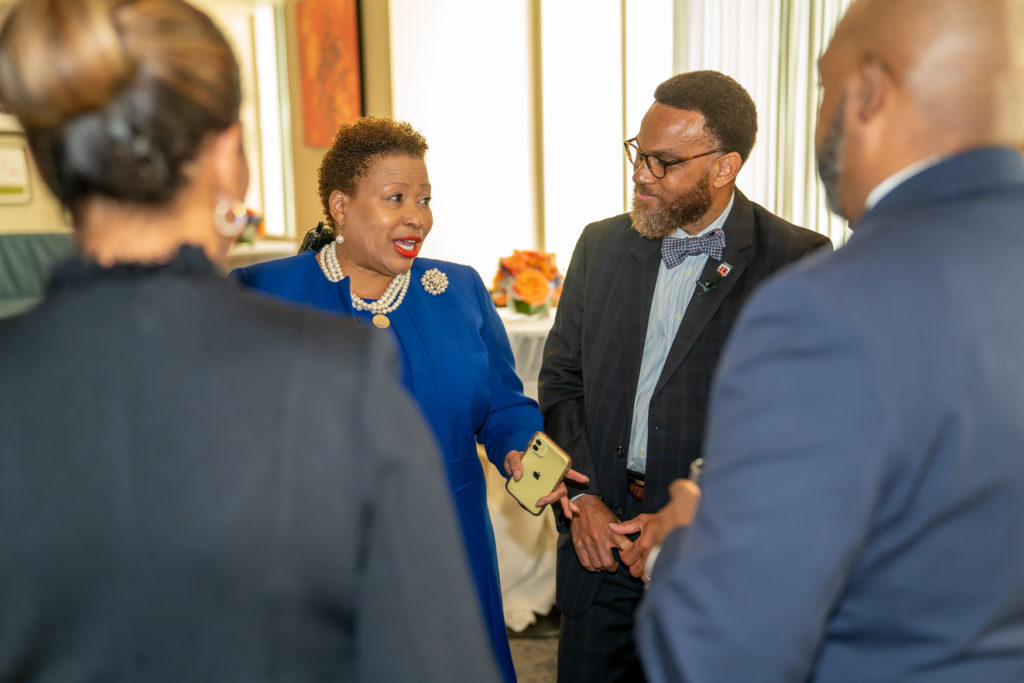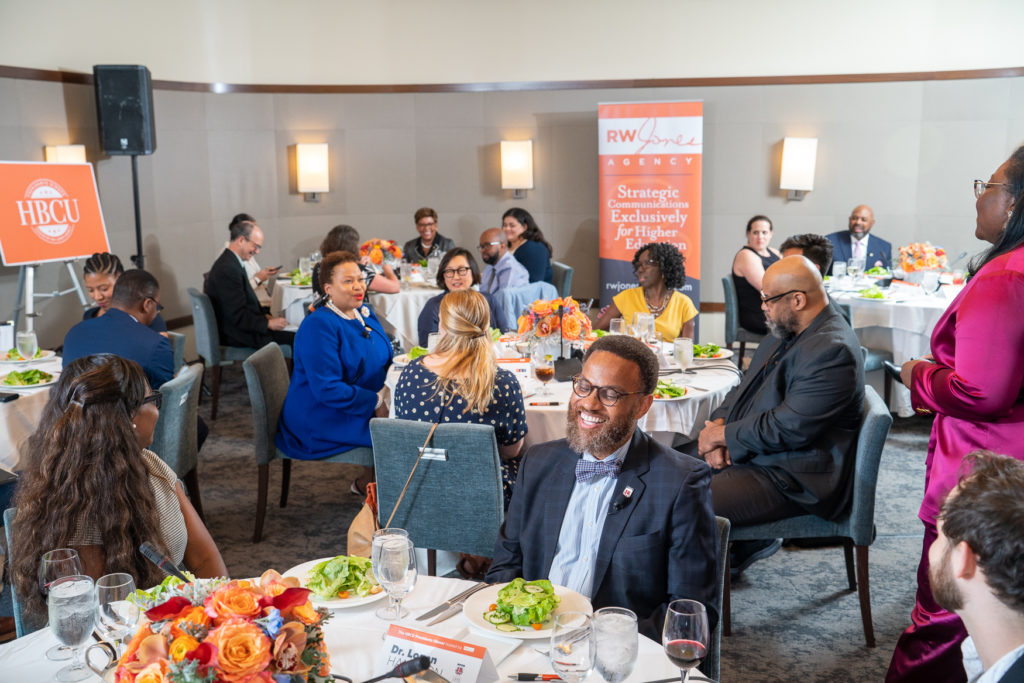The idea of Historically Black Colleges and Universities has caused controversy among those who seek not to understand why something that was once essential remains relevant today. Yet, HBCUs have seen record enrollment numbers this school year and demand for Black-centered spaces has grown exponentially since 2020. Even though the HBCU designation simply represents any college or university established before 1964 with the mission to educate Black Americans, people have erroneously attributed a lack of diversity, poor graduation rates and lesser education to such institutions. Generally speaking, people tend to get a lot of things wrong about Black colleges and universities.
Blavity sat in on an HBCU Presidents dinner in Washington, D.C., hosted by RW Jones Agency, where these leaders spoke at length about a few things that matter most, including busting myths about their institutions as a whole.
What people get wrong about HBCUs
Among the many things that people tend to get wrong about HBCUs, graduation rates seemed to be the biggest misunderstanding of them all.
According to Stillman College’s president, Cynthia Warrick, Ph.D., the U.S. Dept. of Education’s method of calculating graduation rates negatively affects HBCUs as it only counts the matriculation of students beginning as first-time freshmen.
“HBCUs, in particular, enroll students who are coming from lower socioeconomic status, maybe school districts that do not prepare them as well. Various life circumstances occur the freshman year and we’re smaller,” Warrick said. “So, those smaller numbers project to higher percentages than other larger institutions. And I think there’s a flaw in how that’s recorded because if you look at Stillman College in Tuscaloosa, which is where I’m the president, what we see is, well, maybe students in their freshman year today and in the past 10 years, where they were affected by the recession, parents lost their jobs.”
“Now we see similar things happen with COVID. People have lost their jobs. Students have to leave school to provide childcare for their siblings. The minimum wage has not increased over the past 15 or 20 years. So, students are having to work longer in order to make ends meet, to pay their cell phone bills and to pay for their housing sometimes because the Pell grant doesn’t cover what it covered 20 years ago.”
Warrick said even though many HBCUs are affordable, student populations still struggle with finances. While financial disparities may disrupt graduation rates, they have had little impact on success rates.
“I think that looking at a graduation rate as a measure of quality in terms of education is a myth because the quality of our graduates is exceptional,” Warrick said. “These are folks that are becoming doctors, lawyers, so we have very bright folks.”
Another thing that affects graduation rates at HBCUs is transfer rates. Oftentimes, Warrick said, HBCUs receive transfers from predominately white institutions after students find that those schools aren’t the best fit for them.
“What we’re seeing is that we have a high transfer in rate, so we are seeing a lot of students, and I’m sure my colleagues do, too, that go to the predominantly white institution or the larger institution their first year. And it’s not a good fit. It’s not a good environment. So, they transfer to us. And when they transfer to us, they tend to finish on time, do well, develop and succeed, but there’s no one tracking that data — it is not included in this graduation rate.”

Big Money Games
This fall Southern University and A&M College will play their first-ever football game against Louisiana State University. The last time Southern played against an SEC team, one of its players, Devon Gales, was left paralyzed. The concept of what is referred to as “Big Money Games” is a controversial one and a tough decision for some HBCUs to make.
On one hand, there is a large financial investment; on the other hand, students are put at physical and mental risk. To that order, Jackson State University football coach and NFL Hall of Famer, Deion Sanders recently said that he will not allow his team to play against an SEC team, according to Mississippi Clarion Ledger.
“We’re not into sacrificing our kids to get a check,” Sanders said at SWAC media day.
Turns out Sanders’ stance on the media is not a unique one. Benedict College President Roslyn Clark Artis, JD, Ed.D., is a staunch believer in keeping her students safe from SEC games.
“I don’t sell my kids,” Artis said. “You are not putting our kids in danger by putting them up against bigger, stronger, faster, more well trained, more well provided for athletes. I don’t do it. I don’t take money games that endanger my children — never have never will.”
“A second concern for me is the psychological implications. There are occasions where we win, but to put our kids out on national TV to get beat by 50 points, what are you saying? You’re humiliating our kids for money. I don’t sell my kids. I don’t sell their bodies for injury, and I don’t sell their psychological safety by allowing them to be bludgeoned on national TV for 50 or a hundred thousand dollars. It’s not worth it to me.”
Warrick noted that she is glad that her predecessor at Stillman College eliminated the football program. She referred to Alabama’s SEC football programs as an NFL franchise.
“If [my students] go visit the University of Alabama, you see an NFL franchise, not college players,” Warrick said.
While SEC universities entertain the idea of playing football against SWAC universities, Warrick said she’s never gotten an invitation for her students to play against them in basketball, a sport for which they dominate their conference.
“Alabama would not play Stillman [in basketball],” she said. “They were not going to be embarrassed, so it depends on the sport. And certainly, our programs excel in basketball and we’re part of one of the most competitive conferences in basketball. We sent four teams from our conference to the national championship, so it’s a competitive basketball program.”
Response to bomb threats
In February, at least 13 HBCUs received bomb threats, including Tougaloo College and Claflin University, as Blavity previously reported. The Dept. of Education responded by offering grant funding for the affected higher education institutions to secure their premises, Blavity also reported. This, however, came with what some of the presidents felt to be a disrespectful request of them.
Claflin University President Dwaun J. Warmack, Ed.D., said that while the bomb threats were terrifying and painful, the most disappointing part of the experience was the assessment form sent by the Dept. of Education.
“The most disappointing piece for me was the three-to-five-page assessment that they asked for,” Warmack said. “Like, we did something that deserved the bomb threat. Like, it was our fault that we received the bomb threat. I didn’t fill it out, but I did write a really nice letter that got a pretty good response back related to that. It wasn’t nice, honestly, it wasn’t a nice letter, but, I think it’s imperative because, for me, our students are still dealing with that today.”
The form asked presidents to discuss at length their reactions to the bomb threats, what ways they emphasize campus safety and to describe their security systems, among other things.
“As if we did something wrong,” said Tougaloo College President Carmen J. Walters, Ph.D.
The affected colleges and universities did receive an apology letter from the Dept. of Education in response to the assessment forms and were advised to disregard the request for response.
Warmack emphasized that after more than a year of remote learning and experiencing COVID-19 on various levels, including deaths, the issue was far more compound than just threats.
“Then, to come back to the place that’s always been a safe haven for them and to have that fear,” he said. “You don’t get that time back and the impact mental health impact that happens to those students. And so we can talk about graduation rate and all of these other pieces, but for you to have to receive a bomb threat in the middle of the day, to evacuate in rural America where there’s no public transportation system to take you anywhere, and for us, we didn’t have other places to send them, so they had to shelter in place.”
Warmack said parents rang the phones off the hook worrying about their children.
“And then you have to go back to business as usual,” he said. “And if you can hear the recording, right? How many times was the word n****r mentioned in that call — ‘you n****rs would die today,’ and to have to play that back? And for that person answering that call at dispatch to have to deal with that as well. I think it was challenging. It’s still challenging. And again, no one has been brought to justice, and I think that’s why you continue to have this copycat syndrome.”
“I’m beyond frustrated,” Walters said. “I’m very angry that no one has been brought to justice, but there’s been no conversation with us about the investigation at all. I can’t speak for Dr. Warmack, but I know I have a very close relationship with the FBI — they’re right down the street from me. And we have received no information as the first thing.”
“The second thing we were emphatically angry about was the grant process. Why’d I have to apply for a grant when you know I had a bomb threat? You know I had all these expenses you’re telling me, ‘OK, you need to reinforce your buildings. You need to get a new sound system. You need to get a new alarm system, you need to do all these things.’ And there are no dollars to do that. So, I think it’s a complete joke. And then there were definitely no dollars around mental health for our students.”

Should HBCUs still exist?
The question of whether HBCUs should still exist is not even a thought for the presidents of these schools.
“We were born of segregation, not of choice, but segregation, exclusion of our people from educational opportunity,” Artis said. “We were places of hope and opportunity for people who did not have a choice otherwise.”
Artis emphasized that while a conversation on overturning affirmative action policies could potentially impact HBCUs, it shouldn’t because such colleges and universities do not practice discriminatory measures.
“I would argue that we would not fit that definition, but there is going to be some twisted mind that makes that argument, so I think we do have to be concerned about it,” Artis said.
Most importantly, however, HBCUs are not exclusively Black, and many other races and ethnicities have taken refuge at these colleges and universities.
“We have never excluded anyone. Where did the Jewish refugee scholars find a home? HBCUs,” she said. “We never turned away anyone at HBCUs though, born of discrimination, we have never discriminated.”
